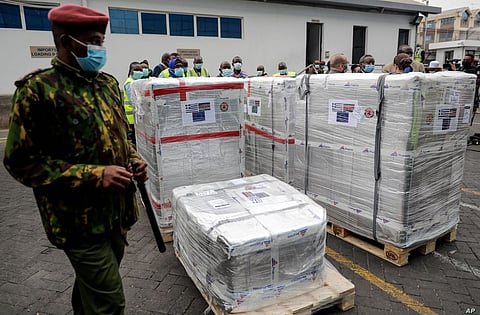
- Home
- न्यूजग्राम
- NewsGram USA
- India
- World
- Politics
- Entertainment
- Culture
- Lifestyle
- Economy
- Sports
- Sp. Coverage
- Misc.
- NewsGram Exclusive
- Jobs / Internships

An international system to share coronavirus vaccines was supposed to guarantee that low and middle-income countries could get doses without being last in line and at the mercy of unreliable donations.
It hasn't worked out that way. In late June alone, the initiative known as COVAX sent some 530,000 doses to Britain – more than double the amount sent that month to the entire continent of Africa.
Under COVAX, countries were supposed to give money so vaccines could be set aside, both as donations to poor countries and as an insurance policy for richer ones to buy doses if theirs fell through. Some rich countries, including those in the European Union, calculated that they had more than enough doses available through bilateral deals and ceded their allocated COVAX doses to poorer countries.
But others, including Britain, tapped into the meager supply of COVAX doses themselves, despite being among the countries that had reserved most of the world's available vaccines. In the meantime, billions of people in poor countries have yet to receive a single dose.
The result is that poorer countries have landed in exactly the predicament COVAX was supposed to avoid: dependent on the whims and politics of rich countries for donations, just as they have been so often in the past. And in many cases, rich countries don't want to donate in significant amounts before they finish vaccinating all their citizens who could possibly want a dose, a process that is still playing out.
"If we had tried to withhold vaccines from parts of the world, could we have made it any worse than it is today?" asked Dr. Bruce Aylward, a senior advisor at the World Health Organization, during a public session on vaccine equity.
Other wealthy nations that recently received paid doses through COVAX include Qatar, Bahrain and Saudi Arabia, all of which have relatively high immunization rates and other means of acquiring vaccines. Qatar has promised to donate 1.4 million doses of vaccines and already shipped out more than the 74,000 doses it received from COVAX.
The U.S. never got any doses through COVAX, although Canada, Australia and New Zealand did. Canada got so much criticism for taking COVAX shipments that it said it would not request additional ones.
In the meantime, Venezuela has yet to receive any of its doses allocated by COVAX. Haiti has received less than half of what it was allocated, Syria about a 10th. In some cases, officials say, doses weren't sent because countries didn't have a plan to distribute them.
British officials confirmed the U.K. received about 539,000 vaccine doses in late June and that it has options to buy another 27 million shots through COVAX.
"The government is a strong champion of COVAX," the U.K. said, describing the initiative as a mechanism for all countries to obtain vaccines, not just those in need of donations. It declined to explain why it chose to receive those doses despite private deals that have reserved eight injections for every U.K. resident.
Brook Baker, a Northeastern University law professor who specializes in access to medicines, said it was unconscionable that rich countries would dip into COVAX vaccine supplies when more than 90 developing countries had virtually no access. COVAX's biggest supplier, the Serum Institute of India, stopped sharing vaccines in April to deal with a surge of cases on the subcontinent.
Although the number of vaccines being bought by rich countries like Britain through COVAX is relatively small, the extremely limited global supply means those purchases result in fewer shots for poor countries. So far, the initiative has delivered less than 10% of the doses it promised.
COVAX is run by the World Health Organization, the vaccine alliance Gavi and the Coalition for Epidemic Preparedness Innovations, a group launched in 2017 to develop vaccines to stop outbreaks. The program is now trying to regain credibility by getting rich countries to distribute their donated vaccines through its own system, Baker said.
But even this effort is not entirely successful because some countries are making their own deals to curry favorable publicity and political clout.(IANS/VOA)
